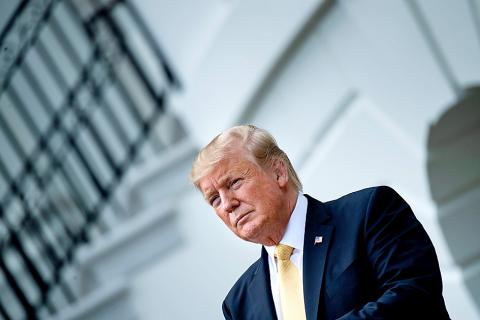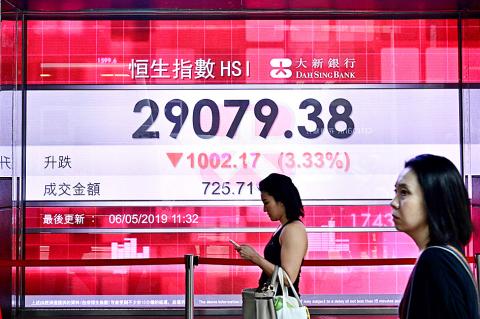US stock index futures yesterday plunged after US President Donald Trump threatened to hike tariffs on US$200 billion of Chinese goods, halting a period of relative calm in the markets.
Standard & Poor’s futures lost more than 2 percent overnight after the Wall Street Journal reported that China was considering canceling a round of US talks this week in the wake of Trump’s comments.
However, China said that a delegation was still preparing to go to the US for trade talks.

Photo: AFP
Trump said tariffs on US$200 billion of Chinese goods would increase to 25 percent on Friday from 10 percent.
Investors pulled back from riskier bets on fears that the trade dispute between the world’s biggest economies was escalating, especially as hopes of a deal have helped stocks surge this year, with the S&P 500 and the NASDAQ indices hitting records last week.
All the 28 Dow components that were trading premarket were in the red. Boeing Co, the single largest US exporter to China, fell 3.3 percent, while Caterpillar Inc also declined 3.3 percent.

Photo: AFP
“The risk-off sentiment has been the response to this swerve from Trump,” said Han Tan, a market analyst at FXTM. “While it remains to be seen whether the Trump administration will press ahead with the added tariffs, it’s already evident that markets are taking some risk off the table, undermining the base case that investors had been pricing in: a formalized US-China trade deal in the near future.”
Wall Street’s fear gauge, the CBOE Volatility index, spiked to its highest level since Jan. 30.
Chipmakers, which get a good portion of their revenue from China, tumbled. Shares of Nvidia Corp, Micron Technology Inc and Intel Corp fell between 2.4 percent and 5.3 percent.
At 6:09am, Dow e-minis were down 508 points, or 1.92 percent. S&P 500 e-minis were down 53.25 points, or 1.81 percent, and NASDAQ 100 e-minis were down 179.75 points, or 2.29 percent.
Apple Inc, Amazon.com Inc, Alphabet Inc, Microsoft Corp and Netflix Inc fell between 1.9 percent and 3.4 percent.
Tesla Inc fell 2.3 percent after US trade officials rejected the company’s bid for relief from tariffs on the Chinese-made Autopilot “brain” of its Model 3.

Taiwanese actress Barbie Hsu (徐熙媛) has died of pneumonia at the age of 48 while on a trip to Japan, where she contracted influenza during the Lunar New Year holiday, her sister confirmed today through an agent. "Our whole family came to Japan for a trip, and my dearest and most kindhearted sister Barbie Hsu died of influenza-induced pneumonia and unfortunately left us," Hsu's sister and talk show hostess Dee Hsu (徐熙娣) said. "I was grateful to be her sister in this life and that we got to care for and spend time with each other. I will always be grateful to

REMINDER: Of the 6.78 million doses of flu vaccine Taiwan purchased for this flu season, about 200,000 are still available, an official said, following Big S’ death As news broke of the death of Taiwanese actress and singer Barbie Hsu (徐熙媛), also known as Big S (大S), from severe flu complications, the Centers for Disease Control (CDC) and doctors yesterday urged people at high risk to get vaccinated and be alert to signs of severe illness. Hsu’s family yesterday confirmed that the actress died on a family holiday in Japan due to pneumonia during the Lunar New Year holiday. CDC Deputy Director-General Tseng Shu-hui (曾淑慧) told an impromptu news conference that hospital visits for flu-like illnesses from Jan. 19 to Jan. 25 reached 162,352 — the highest

TAIWAN DEFENSE: The initiative would involve integrating various systems in a fast-paced manner through the use of common software to obstruct a Chinese invasion The first tranche of the US Navy’s “Replicator” initiative aimed at obstructing a Chinese invasion of Taiwan would be ready by August, a US Naval Institute (USNI) News report on Tuesday said. The initiative is part of a larger defense strategy for Taiwan, and would involve launching thousands of uncrewed submarines, surface vessels and aerial vehicles around Taiwan to buy the nation and its partners time to assemble a response. The plan was first made public by the Washington Post in June last year, when it cited comments by US Indo-Pacific Commander Admiral Samuel Paparo on the sidelines of the Shangri-La Dialogue

Suspected Chinese spies posing as Taiwanese tourists have been arrested for allegedly taking photographs of Philippine Coast Guard ships, local media reported. The suspected spies stayed at a resort in Palawan, where from a secluded location they used their phones to record coast guard ships entering and leaving a base, Philippine TV network GMA said on Wednesday. Palawan is near the Spratly Islands (Nansha Islands, 南沙群島) and other disputed areas of the South China Sea, where tensions have been on the rise between China and the Philippines. The suspects allegedly also used drones without permission and installed cameras on coconut trees in the